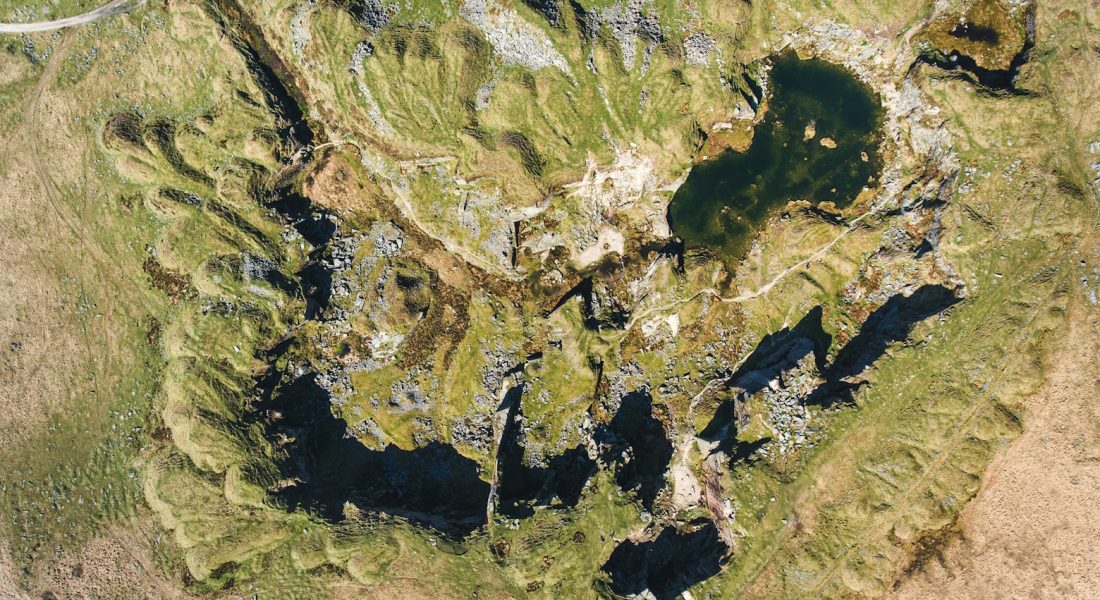Amazon Web Services (AWS) is a leading cloud computing platform, offering a wide range of services like computing power, storage, databases, and analytics. It’s a scalable, pay-as-you-go solution that enables businesses to access virtual servers, manage big data, and deploy applications without significant upfront investments. From startups to enterprises, AWS powers millions of users globally with reliable, secure infrastructure, including tools like Amazon SageMaker for machine learning and Amazon S3 for storage. For geospatial data analytics, AWS provides specialized capabilities to process satellite imagery, IoT data, and more, turning raw location data into actionable insights. This article will highlight companies delivering geospatial data analytics on AWS, using native AWS tools or deeply integrated solutions to drive innovation.

1. FlyPix AI
We offer a platform that uses AI to analyze satellite, aerial, and drone imagery, integrating with AWS to process geospatial data efficiently. Our tools help businesses in industries like agriculture, construction, and forestry by identifying objects and patterns in complex scenes. The platform is designed to be straightforward, allowing users to train custom AI models without needing deep technical expertise. By leveraging AWS’s cloud infrastructure, we ensure that large datasets are handled quickly and securely, supporting tasks like land-use classification or environmental monitoring.
Our approach focuses on making geospatial analysis accessible, with features like user-defined annotations and analytics dashboards that fit into existing workflows. The integration with AWS allows us to scale processing for everything from port operations to ecotechnology projects. We’ve found that clients appreciate the simplicity of getting started, which feels like a small but meaningful win in a field that can sometimes seem overwhelming. Our services aim to provide practical insights, whether for infrastructure maintenance or government applications.
Key Highlights:
- Integrates with AWS for scalable geospatial data processing
- Supports industries like agriculture, construction, and government
- Allows custom AI model training without programming knowledge
- Processes satellite, aerial, and drone imagery
Services:
- AI-driven object detection in geospatial imagery
- Custom AI model training with user-defined annotations
- Analytics dashboards for data visualization
- Multispectral data analysis for environmental applications
- API access for integration with existing systems
Contact Information:
- Website: flypix.ai
- Email: info@flypix.ai
- Phone: +49 6151 2776497
- Address: Robert-Bosch-Str. 7, 64293 Darmstadt, Germany
- LinkedIn: www.linkedin.com/company/flypix-ai

2. Geo.me
Geo.me focuses on delivering location-based services and geospatial APIs to help businesses make sense of spatial data. Established years ago, the company has built a reputation for creating tools that integrate with platforms like AWS to support industries such as retail and mobility. The solutions emphasize practical applications, from crafting tailored digital maps to enabling complex spatial queries, which help businesses optimize operations and improve customer interactions. Geo.me’s integration with AWS allows for scalable, secure processing of location data, making it a solid choice for enterprises looking to harness geospatial insights.
The company’s offerings are designed to be user-friendly, with a focus on flexibility across web and mobile platforms. By leveraging partnerships with major tech providers, Geo.me ensures its tools align with modern enterprise needs, particularly in areas like routing and address validation. The approach feels grounded, with an emphasis on solving real-world problems without unnecessary complexity. For businesses needing customized mapping or analytics, Geo.me provides a straightforward, adaptable set of solutions.
Key Highlights:
- Provides enterprise-grade geospatial APIs and mapping solutions
- Integrates with AWS for scalable data processing
- Supports a range of industries including retail, mobility, and finance
- Focuses on user-friendly interfaces for web and mobile
Services:
- Digital map applications customized for branding
- Complex querying and distribution of location data
- Tools for address validation, geocoding, and reverse-geocoding
- Advanced routing and asset tracking for efficiency
Contact Information:
- Website: www.geo.me
- Phone: +44 (0)330 223 0461
- Address: 30 STAMFORD STREET, LONDON SE1 9LQ, UNITED KINGDOM

3. Esri
Esri has been a cornerstone in the geospatial industry, known for its ArcGIS platform that connects data through geographic context. The company’s technology, available on AWS through partnerships like Amazon Location Service, supports businesses in analyzing spatial data for better decision-making. Esri’s tools are used across sectors like government and infrastructure, helping organizations map everything from urban planning to climate impacts. The platform’s strength lies in its ability to handle diverse datasets, offering insights that range from local to global scales.
What stands out about Esri is its focus on integrating geography into everyday operations. The ArcGIS suite provides robust mapping and analytics capabilities, enabling users to visualize complex data in ways that feel intuitive. The collaboration with AWS enhances scalability, making it easier to process large datasets like satellite imagery. Esri’s approach is practical, with tools designed to fit into existing workflows, which makes it appealing for organizations tackling real-world challenges.
Key Highlights:
- Offers ArcGIS, a comprehensive geospatial platform
- Integrates with AWS via Amazon Location Service
- Supports industries like government, infrastructure, and business
- Focuses on connecting data through geographic context
Services:
- GIS mapping and spatial analytics software
- Geocoding and location-based data processing
- Visualization tools for maps and 3D data
- Spatial analytics for operational and strategic insights
Contact Information:
- Website: www.esri.com
- Email: sitemanager@esri.com
- Phone: +19097932853
- Address: 380 New York Street, Redlands, California, United States of America
- LinkedIn: www.linkedin.com/company/esri
- Facebook: www.facebook.com/esrigis
- Twitter: x.com/Esri
- Instagram: www.instagram.com/esrigram

4. CARTO
CARTO provides a cloud-native platform for spatial analytics, built to work seamlessly with AWS Redshift and other data warehouses. The focus is on enabling businesses to analyze and visualize large-scale geospatial data without complex setups. CARTO’s tools cater to industries like telecom and retail, offering solutions that simplify tasks such as site performance analysis or logistics optimization. The platform’s integration with AWS ensures fast, secure processing, which is handy for organizations dealing with big datasets.
The appeal of CARTO lies in its low-code, user-friendly approach, making spatial analytics accessible to both data analysts and developers. Features like drag-and-drop interfaces and AI-driven geospatial agents streamline workflows, while the platform’s visualization tools handle billions of data points with ease. It feels like a solution built for people who want results without getting bogged down in technical details. CARTO’s emphasis on scalability and collaboration makes it a practical option for enterprises.
Key Highlights:
- Cloud-native platform optimized for AWS Redshift
- Supports industries like telecom, retail, and finance
- Offers low-code tools for spatial analysis and visualization
- Integrates AI for geospatial reasoning and analytics
Services:
- Spatial analysis with drag-and-drop interfaces
- Interactive maps and dashboards for data visualization
- Custom geospatial AI agents for tailored analytics
- Scalable app development for geospatial applications
Contact Information:
- Website: carto.com
- Email: support@carto.com
- Facebook: www.facebook.com/CartoDB
- LinkedIn: www.linkedin.com/company/carto
- Twitter: x.com/CARTO

5. Ioanyt
Ioanyt provides cloud-based IT solutions, including geospatial application development and data processing, with a focus on AWS integration. The company builds tools that leverage AWS services like Amazon Location Service and Elasticsearch to handle location-based data for various industries. The offerings are designed to streamline processes, from app development to analytics, making it easier for businesses to incorporate geospatial insights into their operations. Ioanyt’s work feels practical, aiming to simplify complex tech challenges without overcomplicating things.
The solutions emphasize flexibility, allowing clients to adapt tools to their specific needs, whether it’s for logistics or data visualization. By using AWS’s infrastructure, Ioanyt ensures that applications are scalable and secure, which is crucial for handling large datasets. The company’s focus on cloud services and app development suggests a straightforward approach, prioritizing functionality over flash. It’s the kind of service that feels like a reliable partner for businesses dipping their toes into geospatial tech.
Key Highlights:
- Leverages AWS tools like Amazon Location Service and Elasticsearch
- Supports industries with cloud-based geospatial applications
- Focuses on scalable and secure data processing
- Offers tailored app development for business needs
Services:
- Cloud development for geospatial applications
- Software development for custom solutions
- Data processing using AWS infrastructure
- Integration with IoT for real-time insights
Contact Information:
- Website: www.ioanyt.com
- Phone: +1 (707) 634-4544
- Email: connect@ioanyt.com
- Address: Suite No. 2, BSI Business Park, H-160, Sector 63, Noida, Uttar Pradesh – 201301

6. SeloVerde
SeloVerde operates as a platform to monitor sustainable agricultural practices and combat illegal deforestation in Pará, Brazil, using AWS for geospatial data analytics. The system integrates public data from state and federal agencies to track environmental compliance and supply chain traceability for rural properties. By combining high-resolution satellite imagery with AI and machine learning, SeloVerde provides detailed insights into land use, particularly for cattle and soy production. The focus is on transparency, offering tools to visualize and assess environmental impacts in near real-time.
The platform’s use of AWS allows for efficient handling of large-scale geospatial data, making it accessible for stakeholders like farmers and policymakers. It’s a practical tool, grounded in the reality of environmental regulations, with an interactive map interface that feels intuitive for users. SeloVerde’s strength lies in its ability to connect complex datasets into a cohesive system, addressing real-world challenges like deforestation. The approach is less about flashy tech and more about delivering clear, actionable information.
Key Highlights:
- Uses AWS for geospatial data integration and processing
- Monitors deforestation and agricultural compliance in Brazil
- Integrates data from multiple public agencies
- Employs AI and ML for land-use analysis
Services:
- Environmental compliance assessment for rural properties
- Transparent traceability for cattle and soy supply chains
- Integration of geospatial data from federal and state sources
- Interactive high-resolution mapping for land-use visualization
Contact Information:
- Website: seloverde.info

7. Foursquare
Foursquare develops a geospatial visualization platform, Spatial Studio, designed to analyze and display location-based data over time, with seamless integration into AWS tools like Data Exchange and SageMaker. The platform supports businesses in uncovering trends through interactive maps and advanced analytics, catering to industries like urban planning and environmental monitoring. Users can query data from cloud clusters or upload their own datasets, making it versatile for various applications. The focus on intuitive design and features like 3D tiles and custom color palettes suggests a practical approach to making complex data accessible.
The platform’s strength lies in its ability to handle large datasets efficiently, thanks to AWS’s scalable infrastructure. Features like vector tile generation and collaboration tools streamline workflows for users, from analysts to developers. It feels like a tool built for people who need to dig into spatial data without getting lost in technical weeds. Foursquare’s emphasis on visualization and real-time analytics makes it a solid fit for organizations looking to explore geospatial insights in a straightforward way.
Key Highlights:
- Integrates with AWS Data Exchange and SageMaker for analytics
- Supports industries like urban planning and environmental monitoring
- Offers interactive map visualization with customizable features
- Handles large-scale datasets with cloud-based processing
Services:
- Geospatial data visualization and trend analysis
- Interactive and customizable map creation
- Data querying from cloud clusters like Databricks and Kinetica
- Support for 3D tiles and vector tile generation
- Collaborative map editing and custom color palette tools
Contact Information:
- Website: foursquare.com
- LinkedIn: www.linkedin.com/company/foursquare
- Twitter: x.com/foursquare

8. Privateer
Privateer builds a data fusion platform, Elements, that processes geospatial data from satellites, drones, and terrestrial sources, leveraging AI and machine learning, likely on cloud infrastructure like AWS. The platform delivers insights across domains like land, sea, and space, supporting industries such as finance, defense, and energy. It integrates diverse data streams into a user-friendly interface or through APIs, enabling applications from vessel tracking to disaster response. The approach feels ambitious yet grounded, focusing on turning raw data into actionable decisions.
The company’s use of cloud technology ensures scalability and speed, crucial for handling real-time satellite imagery or supply chain analytics. Privateer’s tools are designed to simplify complex challenges, like monitoring GNSS interference or urban planning, without overwhelming users. There’s a sense of purpose in how the platform connects data to real-world problems, making it approachable for both commercial and government clients. The flexibility of the Elements platform stands out as a key strength for varied use cases.
Key Highlights:
- Likely uses AWS for scalable data processing and analytics
- Supports industries like finance, defense, and energy
- Integrates satellite, drone, and terrestrial data sources
- Employs AI and ML for geospatial insights
Services:
- Data fusion across land, sea, air, and space domains
- Real-time analytics for vessel tracking and pattern monitoring
- API-driven intelligence for scalable applications
- Geospatial insights for supply chain and disaster response
Contact Information:
- Website: www.privateer.com
- LinkedIn: www.linkedin.com/company/privateerspace
- Twitter: x.com/privateerspace
- Instagram: www.instagram.com/privateer.space

9. NOMADICS
NOMADICS provides geospatial data and analytics solutions, focusing on custom systems for public, private, and defense sectors, with likely use of AWS for data-intensive projects. The company builds tools to address challenges in planning, resilience, and sustainability, such as tracking disease spread or optimizing logistics. The solutions are tailored to client needs, emphasizing clarity and reliability in decision-making. There’s a practical vibe to NOMADICS’ work, aiming to solve real problems with straightforward, data-driven approaches.
The integration with cloud platforms allows NOMADICS to handle complex geospatial datasets, from urban planning to defense applications. The focus on custom systems and GEOINT technology feels like a no-nonsense way to deliver insights without unnecessary complexity. Clients benefit from tools that fit specific workflows, whether for government agencies or local communities. The company’s experience in diverse sectors adds a layer of versatility to its offerings.
Key Highlights:
- Likely leverages AWS for data-intensive geospatial projects
- Supports public, private, and defense sectors
- Focuses on planning, resilience, and sustainability
- Builds custom systems for actionable intelligence
Services:
- Custom geospatial analytics and system development
- Consulting for planning and management solutions
- Strategic data-driven solutions for logistics and defense
- Real-time visualization for monitoring and decision-making
Contact Information:
- Website: nomadics.com
- Phone: (973) 771-3745
- Email: info@nomadics.com
- Address: 47 Headquarters Plaza, 4th Floor East Tower, Morristown NJ 07960
- LinkedIn: www.linkedin.com/company/the-nomad-group-dba-nomadics
- Facebook: www.facebook.com/NomadGroup

10. Vexcel
Vexcel focuses on capturing and processing high-accuracy aerial imagery and geospatial data, utilizing cloud platforms like AWS to manage large-scale datasets. The company operates extensive aerial collection programs across multiple countries, covering urban and rural areas with resolutions as fine as 7.5cm. The offerings include a range of products like ortho imagery, 3D models, and AI-enhanced data, designed to support industries such as insurance, urban planning, and environmental analysis. The emphasis on precision, achieved through calibration against ground control points, makes Vexcel’s data reliable for detailed measurements and analytics.
The integration with AWS enables efficient storage and processing of massive image libraries, which is crucial for applications like disaster response or property assessment. Vexcel’s tools, such as the Vexcel Viewer and APIs, allow users to incorporate geospatial data into their workflows seamlessly. There’s a practical feel to the approach, prioritizing usable, high-quality data over flashy features. The company’s focus on diverse imagery types, from multispectral to oblique, caters to a wide range of real-world needs.
Key Highlights:
- Utilizes AWS for hosting and processing large imagery datasets
- Operates aerial collection programs in multiple countries
- Provides high-resolution imagery at 7.5cm to 15cm
- Supports industries like insurance and urban planning
Services:
- High-accuracy ortho and oblique aerial imagery
- 3D modeling and digital surface models
- AI-derived attributes for buildings and roadways
- Multispectral imagery for land and vegetation analysis
- Disaster imagery for events like hurricanes and wildfires
Contact Information:
- Website: vexceldata.com
- LinkedIn: www.linkedin.com/company/vexcel
- Twitter: x.com/vexcel_data
- Instagram: www.instagram.com/vexceldata
Conclusion
Geospatial data analytics on AWS has opened up a world of possibilities for turning raw location-based data into something genuinely useful. From urban planning to environmental monitoring, the ability to process massive datasets with cloud tools feels like a game-changer. It’s not just about crunching numbers; it’s about uncovering patterns that help solve real problems, whether that’s optimizing supply chains or tracking natural disasters. The flexibility of AWS’s infrastructure, paired with specialized platforms, makes it easier for businesses to dig into spatial data without getting bogged down in technical hurdles. Honestly, it’s exciting to see how these tools are shaping decisions across industries. As cloud technology keeps evolving, the potential for geospatial analytics to drive smarter, faster insights only seems to grow.
